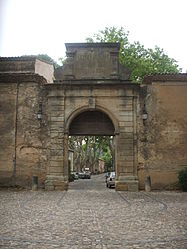Villeneuvette
| Villeneuvette | |
|---|---|
| Commune | |

Village gate
|
|
| Coordinates: 43°36′40″N 3°24′01″E / 43.6111°N 3.4003°ECoordinates: 43°36′40″N 3°24′01″E / 43.6111°N 3.4003°E | |
| Country | France |
| Region | Occitanie |
| Department | Hérault |
| Arrondissement | Lodève |
| Canton | Clermont-l'Hérault |
| Government | |
| • Mayor (2008–2014) | Eric Vidal |
| Area1 | 3.14 km2 (1.21 sq mi) |
| Population (2008)2 | 65 |
| • Density | 21/km2 (54/sq mi) |
| Time zone | CET (UTC+1) |
| • Summer (DST) | CEST (UTC+2) |
| INSEE/Postal code | 34338 /34800 |
| Elevation | 116–317 m (381–1,040 ft) (avg. 140 m or 460 ft) |
|
1 French Land Register data, which excludes lakes, ponds, glaciers > 1 km² (0.386 sq mi or 247 acres) and river estuaries. 2Population without double counting: residents of multiple communes (e.g., students and military personnel) only counted once. |
|
1 French Land Register data, which excludes lakes, ponds, glaciers > 1 km² (0.386 sq mi or 247 acres) and river estuaries.
Villeneuvette is a commune in the Hérault department in the Occitanie region in southern France.
It lies close to the town of Clermont l'Hérault.
Villeneuvette is a small village made up of a group of buildings initially erected in the 17th century to create a royal clothmaking factory and provide accommodation for its workers. Apart from a hotel and restaurant, the buildings are now restricted to residential use, many for holiday purposes.
Creation of Villeneuvette was promoted in 1677 by Jean-Baptiste Colbert the noted finance minister of King Louis XIV. It was one of his many initiatives to develop France's industrial base. Power for the factory was hydraulic with water supplied via different water courses from existing basins. The factory was privately owned and produced cloth for the king including uniforms for his armies. The factory was in existence until 1955.
Since 1995 the village has been classified as a "Zone de Protection du Patrimoine et du Paysage" recognising the originality and importance of its heritage.
The original inscription above the gateway was "MANUFACTURE ROYALE" but was later rather crudely changed by the Republic to "HONNEUR AU TRAVAIL" - Honour in work.
...
Wikipedia


